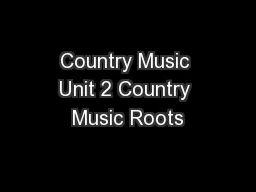PPT-The music of the United States reflects the country’s mul
Author : luanne-stotts | Published Date : 2017-07-22
Among the countrys most internationallyrenowned genres are hip hop blues country jazz barbershop pop techno and rock and roll After Japan the United States has
Presentation Embed Code
Download Presentation
Download Presentation The PPT/PDF document "The music of the United States reflects ..." is the property of its rightful owner. Permission is granted to download and print the materials on this website for personal, non-commercial use only, and to display it on your personal computer provided you do not modify the materials and that you retain all copyright notices contained in the materials. By downloading content from our website, you accept the terms of this agreement.
The music of the United States reflects the country’s mul: Transcript
Download Rules Of Document
"The music of the United States reflects the country’s mul"The content belongs to its owner. You may download and print it for personal use, without modification, and keep all copyright notices. By downloading, you agree to these terms.
Related Documents














